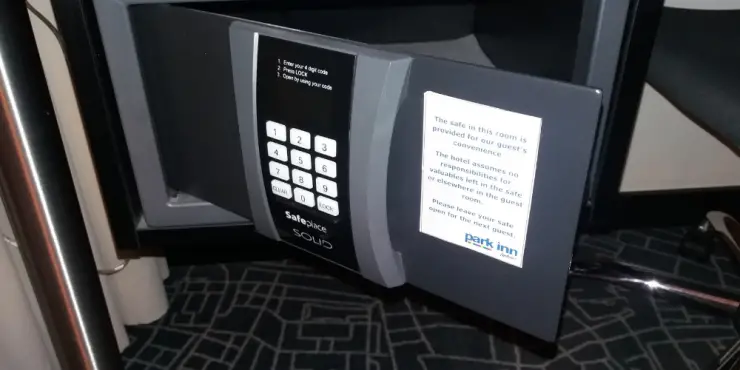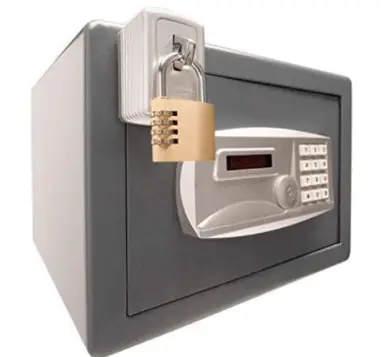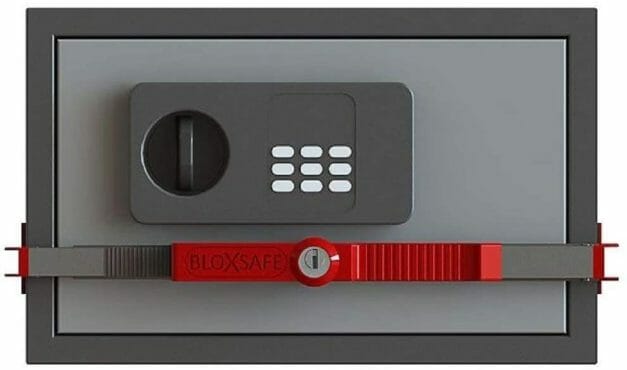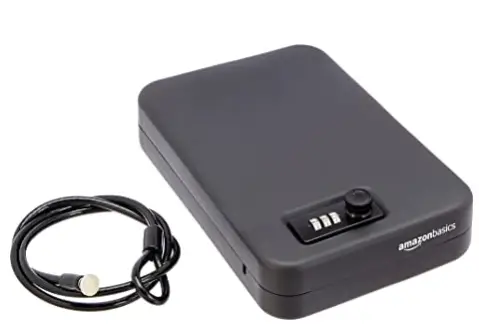Hotel safes are supposed to be safe from theft or fire. However, there is a big possibility that these safes can be broken into.
The risk of hotel safes being compromised is not something new – recent data shows that the number of hotels safe break-in attempts has increased from an average of 4-5 a day in 2008 to over 100 a day in 2014.
Hotel rooms and safes are generally unsafe because of the following factors.
- Management staff usually have access to the system to reset the passcode or, in older safes, the key or master code.
- If the safe is not bolted to the floor, it can be removed, put in luggage, and carried away.
- Hotel safes are usually cheaper models that can be easily drilled or hacked using the passkey or override code.

Top Reasons Why Hotel Room Safes Are Not Safe
Employee Theft
According to a study by The Journal of Hotel Law and Management, hotel employees have been stealing from hotel safes at an alarming rate. A survey of over 200 hotels revealed that the rates of theft by employees are on the rise.
Theft is one of the most common crimes committed in a hotel. The most common way for employees to get into safes is through a master passcode they may have or by trying simple codes that many users use. (1)
A lot of guests use the dreaded 1234 passcode or 1111 etc. This is incredibly easy to crack and get into. So two prevention tactics are best to prevent employee thefts.
1. Use more difficult passcodes
2. Take a photo of the valuables you put into the safe before closing it for proof for law enforcement
Break-ins and Safe Theft
One of the most common ways thieves break into hotel rooms is by using a “master key card.” It is a card that can open any door in the hotel. With it, they can get past security doors with ease.
The key card has become essential to the hotel’s security system. Many hotels have put in place advanced software to help monitor who and when someone enters its premises. But even with these measures, hotels have found it difficult to crack down on key card theft and hacking. (2)
Recently, a couple from Sussex was arrested after police discovered they broke into several hotels using stolen key cards. The couple stole up to £2 million worth of goods from the properties.
Many hotel safes are not bolted down; they can easily be stolen and hidden in a suitcase. When they are stolen, it gives the thieves more time to get tools together, like drills to get them open.
Why Hotel Room Safes Are Safe Enough For Less Valuable Items

The misconception is that anyone who knows the code can access hotel room safes. The truth is that these safes are not as easy to crack open as people believe.
There are a few things that need to happen before someone can break into a hotel room safe:
1. The person has to know the code
2. They have to have physical access to the safe
Even if someone knows the code and has physical access, hotel hallways still have cameras to track who entered and potentially stole the items.
In general, using a safe for smaller items and cheap jewelry is very low risk and much better than keeping them on you where they can get stolen on your visit to the city. This is especially true if you visit a city with a higher crime rate; the benefits outweigh the risks.
What Can You Do To Help Stop Theft From Your Hotel Safe?
With all the emphasis on general security, it’s easy to forget the importance of securing your safe. With that being said, there are precautions you can take to help prevent theft from your hotel safe:
- Make sure to use a complex passcode, not 1234
- Check that the override code of 0000 or 9999 does not work to open your safe [this is because most safes have their manufacturer ship the item with this override code that the hotel needs to change when installing. However, most hotels forget and leave these.]
- Ensure your hotel room door is locked and the deadbolt has left the safe.
- Make sure your hotel safe is bolted to the floor; otherwise, the risk of it being stolen is higher.
- Take a photo of any belonging you put in there for future proof in case employees take something.
- Consider RFID tags – RFID tags are an effective way to keep your valuables safe while traveling. These tags can be put on items for tracking in case they are stolen.
- Keep valuable documents such as passports, social security cards, and birth certificates on your person at all times.
- Keep travel-related emergency contact information on your person at all times.
Make Your Hotel Safe Safer With Additional Security Devices
If you are set on using your hotel safe and want to keep some higher-value items inside, we recommend you invest in an aftermarket security device. These items can be easily brought along in your luggage and used to secure your safe. These are very useful for frequent travelers that constantly need to use their safe.
Hotel Safe Lock (Padlocking Deterrent)

This lock essentially is a secondary padlock to your safe. It’s installed by putting a small device through your safe on lock, preventing it from being unlocked unless your secondary padlock is bypassed.
This extra level of security eliminates the issue of hacking and easy security codes being bypassed. It, however, does not eliminate the risk of the safe being stolen and later drilled, so check that the hotel safe is bolted down before using it.
Anti-Theft Ratchet Bracket Hotel Safe Lock

This great device looks like a belt that goes around your safe and locks it down. Again you need to make sure your safe is bolted down, or the safe can be stolen and drilled later, but if not, this is a great little device to prevent any issues.
Portable Safe Box
This portable safety device has its pros and cons. The pros are you don’t have to worry about employees with the safe master code breaking in and taking your valuables. But the cons are these boxes usually are not that secure, most professional criminals can easily drill these to get inside, and because of their small size, they’re easy to steal out of the hotel.
Overall we don’t recommend one of these unless your prime concern is employees that may have the hotel safes master key.
Comparison: Recommended travel and Hotel Room Safety Devices
Of these three, we recommend the first option, which is the hotel safe lock, then the belt lock, and finally, we are on the fence as to whether the portable safe box is any better than the safe itself.
Types Of Hotel Room Safes
Electronic Safe With Keypad – Manual override with keys
Safe with Manual Key Access – Typically used in older hotels
Biometric Hotel Safe – Uncommon due to cost and learning curve
A Few More Hotel Room Security Precautions
Before checking in, it would be best to be mindful of some safety tips.
1) Find out if your hotel has an alarm system with guest-activated buttons near the bedside for emergencies.
2) Ask if your hotel provides fire extinguishers.
3) Ensure that there is enough space between the bed and walls or other pieces of furniture.
4) Take plenty of pictures or videos of the room before you enter to show any damage that may have occurred. That will help when trying to return the room key and get reimbursed for damages.
Check the video below;
Pros and Cons Of Hotel Safes
Pros of hotel safes include:
- Convenience: Hotel safes allow guests to securely store valuables, such as money, jewelry, and important documents, without carrying them around during their stay.
- Peace of mind: Knowing that valuables are locked away in a safe can give guests a sense of security and peace of mind.
- Versatility: Many hotel safes are designed to accommodate many items, including laptops and other electronics.
Cons of hotel safes include:
- Limited security: Hotel safes may not be as secure as a personal safe or a safe deposit box at a bank.
- Possible extra fee: Some hotels may charge an additional fee to use the safe, which may be an added expense for guests.
- Limited access: Guests may not have access to their valuables stored in the safe during certain times, such as when the hotel’s front desk is closed.
- Risk of malfunctioning: Safes can malfunction or have technical issues, which can cause inconvenience to guests and property.
References:
(1) common crimes committed in a hotel – https://www.researchgate.net/publication/248876983_Examining_hotel_crimes_from_police_crime_reports
(2) hacking – https://www.malwarebytes.com/hacker

